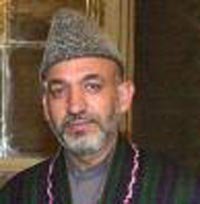
Hamid Karzai was born on December 24, 1957 in Karz, Kandahar.
His father Abdul Ahad Karzai was a political leader and Deputy Speaker of the Afghan Parliament.
In 1979, however, while Karzai was a student in India, the Soviet Union invaded Afghanistan and his family fled to Quetta, Pakistan.
Karzai joined the resistance and when the Soviets withdrew from Afghanistan in 1989, Karzai returned and served for a time in the cabinet under Afghan president Burhanuddin Rabbani.
In 1992 he became the Deputy Foreign Minister of Afghanistan, but he left Kabul in 1994 for Kandahar, after factional fighting intensified.
Growing disenchanted with the corruption of the mujahideen he aligned himself with the Taliban but Karzai fell out with them in the mid 1990s as their extremism became more evident. This schism escalated when in 1999 his father was assassinated.
Karzai blamed the Taliban, and rallied support against them from around the world. The attacks of September 11, 2001 proved a catalyst to international action.
Karzai helped negotiate the Taliban’s surrender of Kandahar, its last remaining stronghold, at the end of 2001. Karzai became interim prime minister of Afghanistan. A special session of Afghan representatives voted to appoint Karzai transitional head of state until the country held its first-ever general elections.
In December, 2004 Hamid Karzai was sworn in as Afghanistan’s first popularly elected president. At his inauguration he called for help from the international community to bolster Afghanistan’s young democracy in its battle against the threats of terrorism and drugs.
Amongst those in attendance were US Vice President Dick Cheney and Secretary of Defense Donald Rumsfeld.
A shift in Hamid Karzai’s approach to the West and the USA in particular was indicated just before his visit to the USA to see George W Bush in May 2005.
